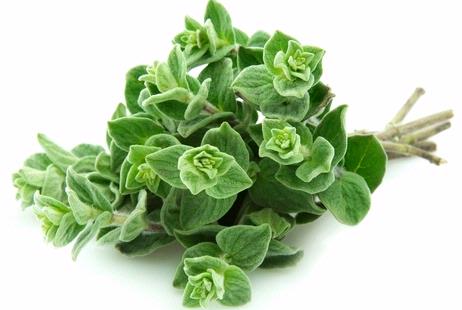Who does not know pizza or spaghetti? Italian cuisine has a distinctive taste and aroma of one of them because of the oregano.
Oregano, which is used to kulinari in each country, a different species such as Greek oregano, oregano Russia, Algeria oregano, Turkish oregano or oregano Syria. Commonly used as spices are oregano leaves and flowers.
Currently dried oregano leaves easy to get at the Supermarket in Indonesia.
Chemical Compounds
Essential oils derived from plants of the genus Origanum contains tannin compounds, phenols (carvacrol, thymol, cineole and borneol), hydrocarbon monoterpenes: limonene, terpinene, ocimene, caryophyllene, alpha-pinene, beta-pinene, alphaterpinene, beta-bisabolene, p-cymene, myrcene, and camphene), and alcohol monoterpenes (linalool and 4-terpineol).
Oregano plants also contain compounds such as fatty acids rosmarinat acid, palmitic acid, stearic acid, oleic acid, ursolat, kafeat acid, and capric acids. Minerals such as potassium, magnesium, manganese, zinc, copper clan. Contained vitamins, including vitamin B3 (niacin) and beta-carotene.
Taste Very Sharp
Dried oregano leaves have a sharper flavor than the fresh leaf. Oregano is a spice that are important and widely used in Turkish cuisine, Greek, Portuguese, Spanish, Latin American, and Italian. Dried or fresh oregano leaves commonly added to soups, casseroles, sauces, stews, fillers, eggs, olive oil, tea, tomato-based dishes, and pizza.
Flavor is also similar to oregano flowers and leaves can be used to add flavor and decoration in salads and other dishes.
Oregano is also commonly added in tomato sauce, fried vegetable, and roasted meat. The use of oregano with basil (basil), giving the characteristics typical of Italian cuisine. In the Philippines, oregano is used when boiled beef to reduce the odor of meat and gives spicy taste (spicy). Oregano smells fragrant, slightly bitter taste, and give a warm effect. Oregano has a good quality taste is very sharp and can make liclah almost numb.
Origanum vulgare subsp. hirtum has a spicy flavor, heat, and pungentterbaik. Allegedly involved in the formation of a sharp and pungent flavor is a compound carvacrol.
Medical usefulness
Hippocrates, the father of medicine, have used oregano to prevent infection and treat stomach aches and mild respiratory disorders. In China, doctors prescribe oregano to ward off fever, diarrhea, nausea, jaundice, and itching skin. In Greece, since ancient times, the oregano is used to compress the muscle pain.
The researchers found that the compounds carvacrol and thymol in oregano may help to eliminate mucus in the lungs and spasm in the throat. Consumption of three cups of brewed oregano flowers every day to overcome digestive complaints, such as spastic colon. Efficacy is partly thanks to the content of thymol, carvacrol, borneol, and kafeat acid.
Based on the antitumor activity test, ursolat acid components of oregano is hepatoprotektor, so it can be used to prevent heart disease. Oregano can also treat indigestion, colds, colds, flu, bronchitis, coughs, throat infections and reduces.
Oregano flowers not only beautiful, but also has advantages, such as to overcome cramps, headache, abdominal pain, menstrual-related symptoms, too seasick. Flowers oregano can treat pain and infection caused by rheumatism, using warm water mixed dried oregano flowers to shower.
Organic Oil
According to various studies, organic oils from Origanum vulgare is antiseptic, antibacterial, antimicrobial, antiparasitik, antifungal, anticarcinogenic, anti-inflammatory, antioxidant, antimutagenic, and analgesics. Antibacterial effect was thanks to its ability to penetrate cell membranes and disrupt its integrity.
The results showed, if the bacterial cell contact with the compounds carvacrol and thymol in oregano oil will cause leakage of cell membranes in bakterijuga bakteri.Tingkat acidity will rise, thereby disrupting the bacterial cell metabolism and replication.
Phenolic components (carcravol and thymol) contained in these oils can inhibit growth, can even kill harmful microbes that infect humans. Many studies have shown that oregano oil effective against disease-causing bacteria in food, such as Eschericia coli, Listerio monocytogenes, Salmonella typhimurium, and Staphylococcus aureus.
Other studies have reported that oregano oil is effective against fungi and yeasts such as Candida albicans can infect humans and grow unchecked if the body condition changes. Research at the University of West England reported, Origanum vulgare oil can kill the superbug Methicillin-Resistant Staphylococcus aureus (MRSA), even when diluted with a ratio of 1.000:1.
Oregano oil is rich in acidic components that act as anti-inflammatory rosmarinat. Rosmarinat acid can reduce the number of neutrophils (white blood cells that make up the congestion inflammation) and eosinophils (white blood cells that produce harmful reactive oxygen species, including free radicals).
Therefore, oregano oil can be used to treat inflammatory disorders such as cough, cough accompanied by shortness of breath, asthma, bronchitis, rheumatoid arthritis, indigestion (dyspepsia), acne. Can also relieve insect bites and spider, toothache, muscle aches, and sore gums.
Oregano oil contains acids and quersetin rosmarinat, which functions as an antioxidant that can protect cell damage caused by free radicals. Research in 2001 reported that oregano oil has oxygen radical absorption capacity (Oxygen Radical Absorption Capacity = ORAC) four times higher than the fruit of blueberries, 12 times higher than oranges, and even higher than vitamin E.
ORAC test is a standard method for measuring the antioxidant properties contained in food. The higher the ORAC value, the higher the concentration of antioxidant components.
Laboratory tests showed that the antioxidant components of oregano oil can prevent the oxidation of LDL (bad cholesterol), factors that cause heart disease. Other studies have reported, antimutagenic and anticarcinogenic effect of oregano oil is useful in preventing and treating cancer.
Prof. Made Astawan DR.dr Food Technology and Nutrition Experts


 12:03 PM
12:03 PM
 Unknown
Unknown


0 comments:
Post a Comment